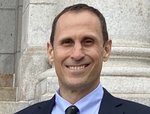

I am reading an excellent book. It is called "Until We Reckon" and was written by Danielle Sered, the executive director of Common Justice, a unique program in New York City that offers alternatives to incarceration for violent crimes.
In her 2019 book, Sered "asks us to reconsider the purposes of incarceration and argues that the needs of survivors of violent crime are better met by asking people who commit violence to accept responsibility for their actions and make amends in ways that are meaningful to those they have hurt — none of which happens in the context of the criminal legal system today."
As Common Justice states, "Community is what keeps us safe, not prisons. Something else is possible."
That something includes listening to the needs of survivors and doing what they want, not what we think they want, which often is not what people expect.
This doesn't mean there is no accountability for wrongdoing. It means we think about crime, punishment, and justice in a way that is more restorative than punitive. Solutions meet the needs of those harmed, create paths for rehabilitation, and foster racial equity without relying on incarceration.
The United States incarcerates nearly 2 million people and locks up more people per capita than any other nation, at the rate of 573 per 100,000 residents. According to Vera, a national organization fighting to end mass incarceration, as of 2019, 57 percent of the prison population was serving sentences of 10 or more years. And as of 2020, one in seven people in U.S. prisons was serving a life sentence, more than the country’s entire incarcerated population in 1970.
What we are doing is not working. If it was, the U.S. would be the safest country in the world. Instead, we are one of the most violent and conflict-ridden.
As Vera explains, research shows that long prison sentences don't actually improve safety:
Concepts that have been central to sentencing theory, policy, and practice to date — such as retribution, deterrence, and excessive incapacitation — have been backed by paltry evidence of success, demonstrating, instead, more evidence of harm. States and the federal government have leaned on these principles to justify as much prison time as possible. But doing so has not been effective in delivering accountability and building public safety. Instead, this system has caused harm that has disproportionately impacted Black and Latinx communities.
Vera's 2023 report, A New Paradigm for Sentencing in the United States, shows how we arrived at this dismal reality and charts a path forward. They explain why our system can, and must, shift away from its overreliance on incarceration and toward community-based sentences, outlining seven key sentencing reforms that could end mass incarceration and increase public safety.
It's not too late for the U.S. as a country, and us, as citizens, to change course. Public safety starts with accountability. And accountability needs to start with humanity and a community approach to stop the violence, start the healing, and make things right.
Common Justice is doing this. In Minneapolis, Restorative Justice Community Action (where I am a board member) also is building and implementing practical strategies to hold people accountable for harm, break cycles of violence, and secure safety, healing, and justice for survivors and their communities.
A restorative process can do more than dismantle the prison industrial complex. It can help us restore — and redeem — our humanity.
It won't be easy. Nothing transformative ever is.
An important piece of the restorative puzzle is forgiveness. All human beings are imperfect. Everyone makes mistakes. Forgiving those mistakes is how we elevate our humanity and turn pain to power.
Forgiveness can be difficult. Psychologist Robert Enright, a professor of educational psychology at the University of Wisconsin and expert on forgiveness, is the author of "8 Keys to Forgiveness" and explains where to start.
No one is disposable. Everyone has value. We need to determine what alternatives to incarceration benefit the whole community and enact them. This is a journey that affirms humanity. This is a journey we all can take.
Because we are all human.
Eric Ortiz lives in the Wedge with his family. When he’s not community building, he’s the head of content and strategy for Big Edition and writes bilingual children’s books with his kids. Their first book, “How the Zookalex Saved the Village,” is available in English and Spanish.
Comments
No comments on this item Please log in to comment by clicking here